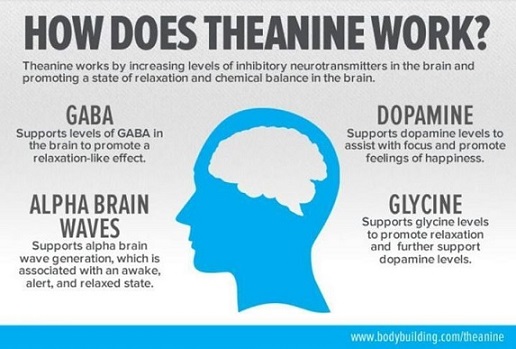In today's fast-paced world, finding natural ways to relax and de-stress is more important than ever. One natural compound that has caught the attention of both scientists and health enthusiasts alike is L-theanine.
This amino acid, predominantly found in tea leaves, promises a unique type of relaxation without drowsiness. L-theanine is also an essential ingredient in matcha.
L-theanine in matcha is why matcha drinkers feel calm, focused, and energized. If you ever felt a drastic positive change in mood after slurping a cup of matcha, it probably was the L-theanine talking!
But what is L-theanine, and how does it help promote a calm mind?
Let's dive in.
What is L-theanine?
L-theanine is a unique amino acid, distinct in its properties and sources. While most amino acids are primarily associated with the structure and function of proteins in our bodies, L-theanine takes a different route, mainly influencing our neurochemistry and overall brain function.

Source: Suntheanine.com
Let's take a closer look at L-theanine to find out more about its origin and modern-day usage:
Origin and Natural Sources:
L-theanine, also known as N-ethyl-L-glutamine, is primarily found in tea leaves, especially those of the Camellia sinensis plant, which produces green, black, and oolong teas. The Camellia sinensis plant is also the source of matcha. These tea varieties have been consumed for thousands of years across civilizations.
While they were praised for various health benefits, the primary component giving them their relaxation properties was unknown until modern science identified them as L-theanine. Interestingly, small amounts of L-theanine can also be found in certain species of mushrooms.
Chemical Structure and Relation to Glutamate:
From a structural standpoint, L-theanine is similar to glutamate, an amino acid naturally produced by our bodies. Glutamate is an excitatory neurotransmitter, which means it stimulates brain activity.
L-theanine's similarity to glutamate allows it to bind to the same brain receptors, but instead of exciting the brain, L-theanine has the opposite effect, promoting relaxation and reducing nervous activity.
Solubility and Stability:
What makes L-theanine particularly interesting is its solubility in water. When tea leaves are steeped in hot water, L-theanine is easily extracted. This means a freshly brewed tea (or matcha) can deliver a significant dose of this calming amino acid.
Additionally, L-theanine is stable within a broad pH range, ensuring it remains intact and effective in various conditions, from the acidic environment of our stomachs to the neutral or slightly alkaline pH of most teas.
Isolation and Modern Use:
While historically consumed as a tea component, today's advances in science and technology have made it possible to isolate L-theanine and manufacture it as a standalone dietary supplement. This means that even those who don't fancy a cup of tea can still enjoy the benefits of L-theanine in pill or powder form.

Source: 7Foods
How Does L-theanine Work?
L-theanine quickly crosses the blood-brain barrier upon consumption, influencing the brain's neurotransmitters. These are chemical messengers responsible for communication between brain cells. L-theanine increases the production of gamma-aminobutyric acid (GABA), a neurotransmitter crucial in promoting relaxation.

Source: GreenTeaLobby.com
GABA is essentially the brain's "brake pedal." It prevents the overactivity of neurons, resulting in a calming effect on the mind. L-theanine also boosts dopamine and serotonin – neurotransmitters associated with pleasure, reward, and mood regulation. This might explain why we often feel relaxed and uplifted after a cup of tea.
Not Just Relaxation: Focus and Clarity
The charm of L-theanine doesn't stop at its relaxation properties. One of the most intriguing aspects of this amino acid is its dual action: it can help to calm the mind while simultaneously enhancing cognitive functions such as focus, attention, and clarity.

Alpha Brain Waves and Relaxed Alertness:
Brain waves, the electrical patterns created by the activity of our neural circuits, vary based on our state of consciousness. Alpha brain waves, typically operating at a frequency of 8-14 Hz, are associated with forms of relaxed alertness.
Our brain exhibits increased alpha wave activity when we are awake but in a restful and reflective state, say during meditation or daydreaming. L-theanine has been shown to promote these alpha waves, explaining the unique sensation of being calm and mentally alert after consuming it.
Synergy with Caffeine:
Many of us are familiar with the stimulating effects of caffeine. However, when taken alone, caffeine can sometimes lead to jitters, nervousness, or a forgetful feeling. Remarkably, when L-theanine is consumed with caffeine—as it naturally is in matcha—the two compounds demonstrate a synergistic relationship.

L-theanine smooths out the rough edges of caffeine, reducing the potential for jitteriness or overstimulation while simultaneously enhancing its positive effects on focus and attention. This synergy explains why a cup of matcha can provide a more balanced and sustained energy boost than a cup of coffee.
Benefits for Task Performance:
Several studies have explored the effects of L-theanine on cognitive performance. When subjects are given tasks that require sustained attention or rapid responses, L-theanine supplementation often results in improved accuracy and quicker reaction times.
This suggests that not only does L-theanine help in relaxation, but it may also directly boost certain cognitive functions.
Mood Regulation and Emotional Clarity:
Beyond focus and attention, evidence suggests L-theanine can play a role in mood regulation. By modulating neurotransmitter levels and activity in the brain, L-theanine may help balance our emotional responses, leading to clearer decision-making and better emotional insight.
Drinking matcha (a potent L-theanine resource) can help improve one's mood.
TL;DR: Introduction to L-theanine
Nature often holds the key to our well-being, and L-theanine is a prime example. This remarkable amino acid offers a gentle yet effective way to calm the mind without inducing drowsiness.
Benefits of L-theanine include:
- Has a calming effect on the mind
- Promotes a ‘relaxed alertness’ state of mind
- Pairs well with caffeine
- Mood and focus enhancer
So, the next time you're feeling stressed or overwhelmed, consider brewing yourself a cup of green tea. As you sip and relax, you'll be benefiting from millennia of ancient wisdom and the natural power of L-theanine.


